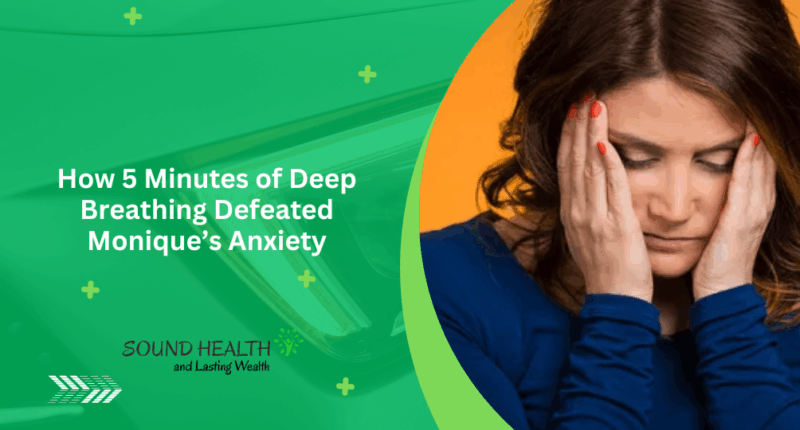- Anxiety affects both psychological and physical health, often worsening if untreated.
- Short daily sessions of deep breathing can significantly reduce stress hormone levels.
- A mix of specific breathing exercises—diaphragmatic, box, and 4-7-8—can enhance relaxation.
- Deep breathing provides cardiovascular, immune, and sleep benefits beyond anxiety relief.
- Making breathing practice a regular habit integrates easily into various lifestyles.
Anxiety can quietly unravel one’s sense of peace and well-being over time, becoming an invisible burden that affects both mind and body. Monique’s story is a powerful testament to how a simple yet consistent practice changed her life. For years, she battled relentless anxiety that followed her from morning till night. The transformation began with just five minutes of deep breathing each day—a technique that not only quelled her anxious feelings but restored her health and vitality. This article sheds light on Monique’s journey, the breathing exercises that brought her relief, and the surprising health benefits that extend beyond anxiety relief.

How Monique’s Anxiety Started Affecting Her Health: A Silent Struggle
When Monique first encountered anxiety, it was mild and intermittent, but as time passed, it grew persistent and overwhelming. Her mind constantly raced with worries, leaving her exhausted and unable to concentrate. Physically, the symptoms manifested as headaches, elevated heart rate, and digestive discomfort. Studies show that chronic anxiety can increase cortisol levels significantly, disrupting sleep and weakening the immune system—in ways Monique began to feel firsthand. As days turned into months, her body bore the weight of mental turmoil, causing fatigue and frequent illnesses that derailed both her work and personal life. Anxiety’s physical toll, left unaddressed, set the stage for her urgent search for relief.
Deep Breathing Exercises for Anxiety Finally Brought Relief
After numerous attempts at therapy and medication, Monique found a surprisingly simple solution through deep breathing. Research supports that deep breathing activates the parasympathetic nervous system, encouraging relaxation and reducing stress hormones almost immediately. Incorporating a brief, structured breathing routine into her daily schedule marked a turning point. In just five minutes, she experienced clearer thinking, reduced tension, and a sense of calm that had eluded her for years. This breakthrough highlights how accessible and effective controlled breathing techniques can be as a complementary approach for anxiety management. Monique’s gradual improvement exemplifies the science-backed power of breathwork in calming the nervous system.
Her Go-To Breathing Exercises for Anxiety: Simple, Effective, and Easy to Follow
Monique developed a personalized breathing routine combining elements from proven methods, including diaphragmatic breathing, box breathing, and 4-7-8 breathing techniques. This approach helped her gently reset her nervous system throughout the day, especially when anxiety spikes struck unexpectedly.
- Diaphragmatic Breathing: Inhale deeply through the nose, allowing the abdomen to rise, hold briefly, then exhale fully through the mouth. Repeat for 5 minutes.
- Box Breathing: Inhale for 4 seconds, hold the breath for 4 seconds, exhale for 4 seconds, and pause for 4 seconds. Cycle this for 5 minutes to regain calm focus.
- 4-7-8 Breathing: Breathe in quietly through the nose for 4 counts, hold for 7 counts, and exhale forcefully through the mouth for 8 counts. Repeat multiple times.
Monique found that alternating these exercises kept the practice engaging and maximized relaxation. The routine was simple enough to fit into a busy day but powerful enough to create measurable changes in her anxiety levels.
3 Other Health Benefits of Deep Breathing That Go Beyond Anxiety Relief
Monique’s experience with deep breathing offered more than emotional healing; it brought a holistic upgrade to her overall health. Scientific studies confirm these additional advantages:
1. Improved Cardiovascular Health
Deep breathing helps lower blood pressure and reduce heart rate by promoting blood vessel dilation and enhancing oxygen delivery to tissues. Over time, regular practice can decrease the risk of heart disease.
2. Enhanced Immune Function
By reducing stress hormones like cortisol, deep breathing supports the immune system’s ability to function optimally. This means fewer infections and a quicker recovery when illness occurs.
3. Better Sleep Quality
Anxiety often disrupts sleep, but deep breathing encourages relaxation and calms restless thoughts. Monique noticed she fell asleep faster and enjoyed deeper sleep cycles after consistent routine adherence.
Monique’s transformation illustrates how the power to change often lies in small, manageable steps. Her story underscores a universal truth: sometimes, the simplest tools can bring profound healing.
Also Read | This New Flu-Detecting Gum Could Change How You Get Tested










